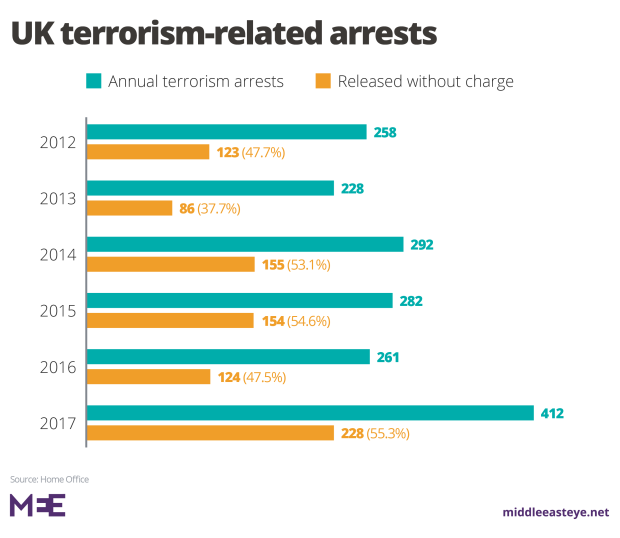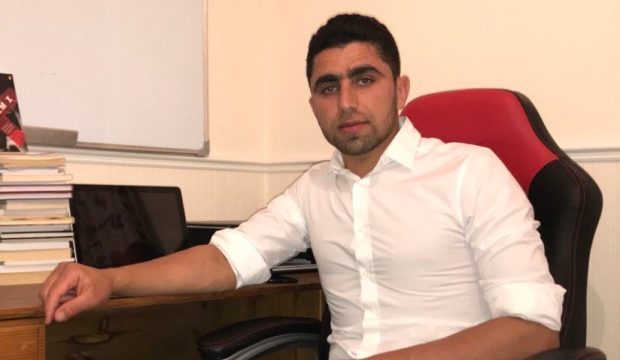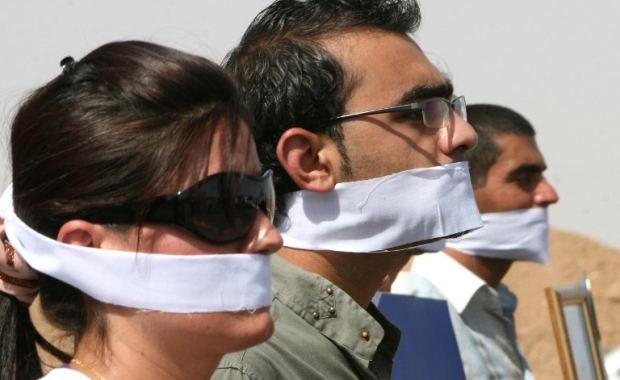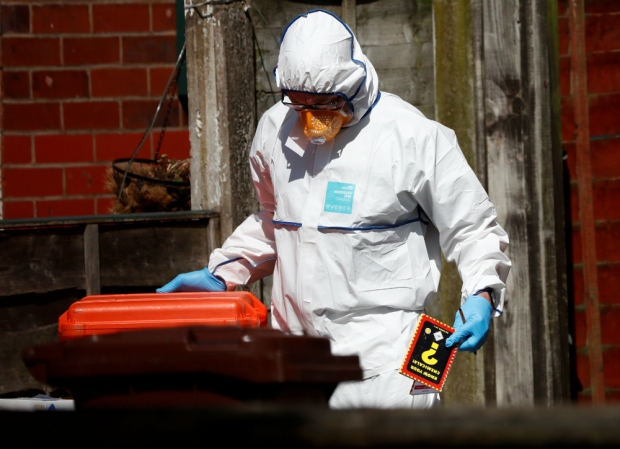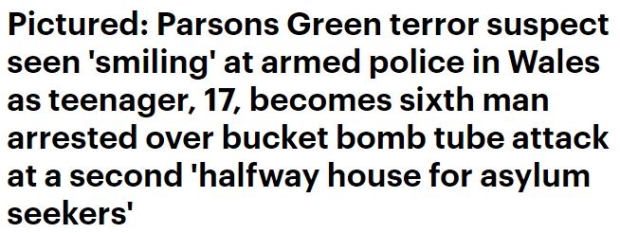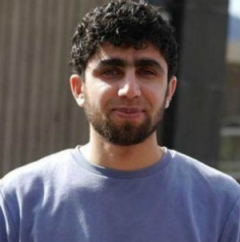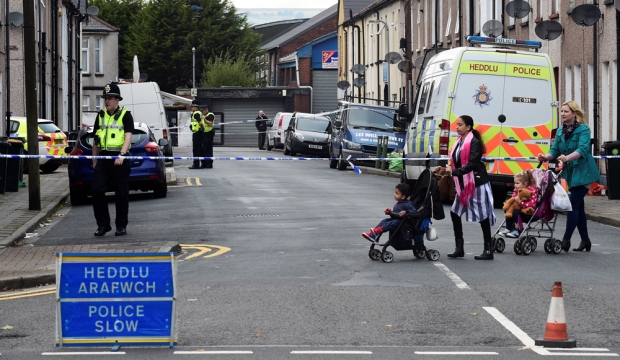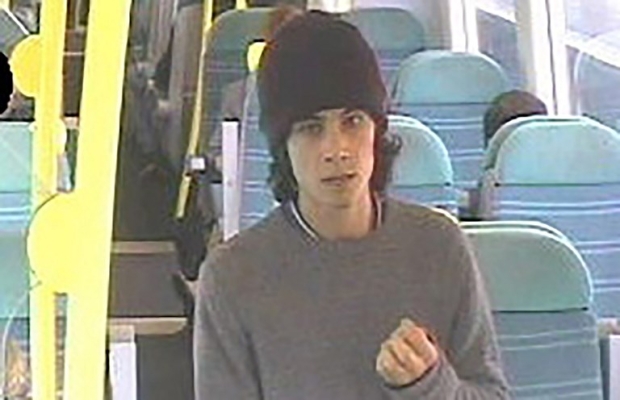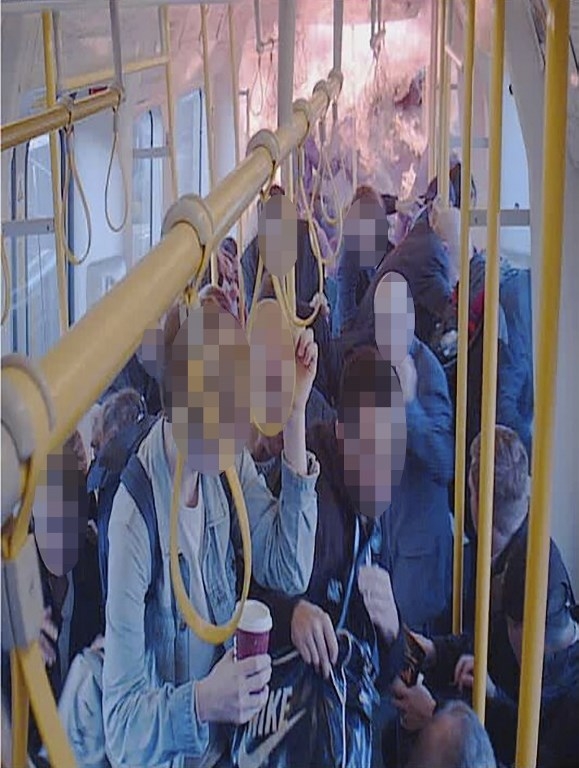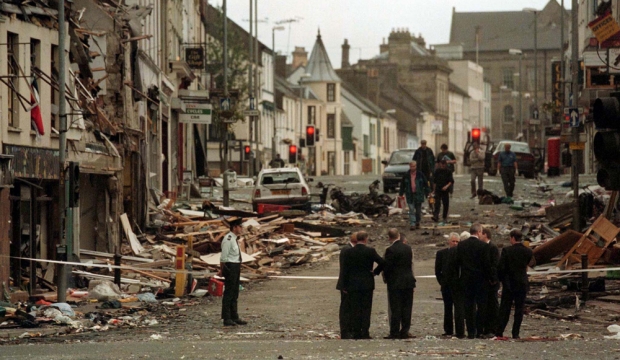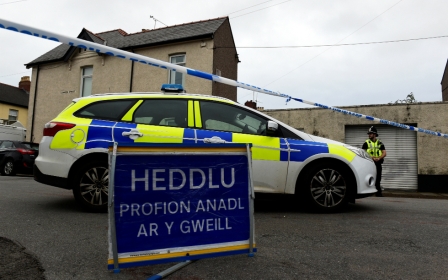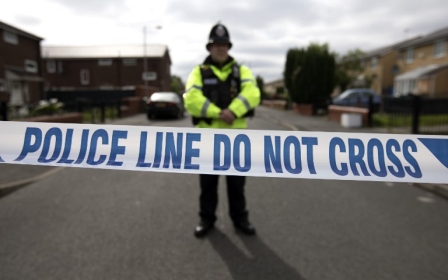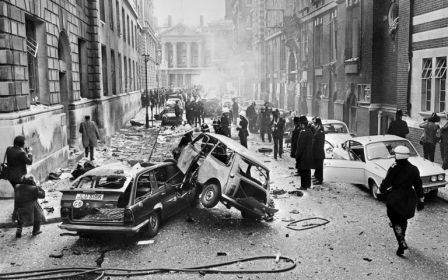What happens to an innocent man swept up in a terrorism investigation?
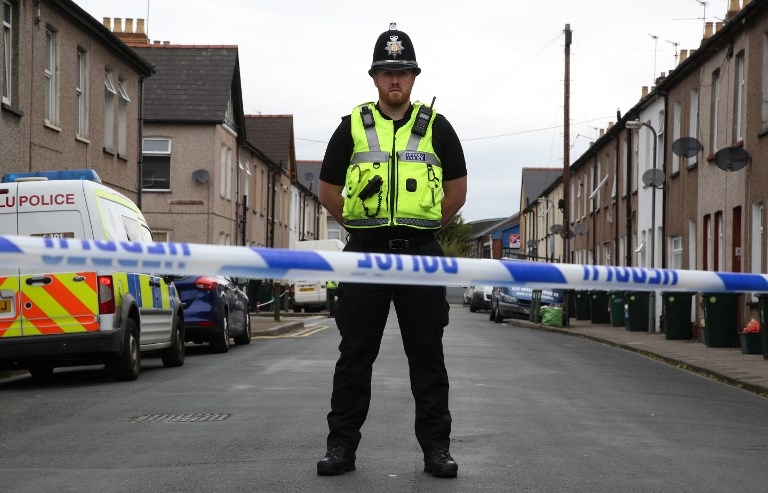
The police car sped away leaving Mahdi Rahimi outside a home he could no longer enter.
The 25-year-old asylum seeker had arrived back to Newport, Wales after spending seven long nights inside a police cell in London as part of the investigation into the Parsons Green train bombing.
Police had then sealed off the home where he had spent his happiest days since arriving in Britain several years before. He was now homeless.
Parsons Green was the last in a string of attacks to hit London and Manchester last year which claimed 36 lives and left scores injured.
Thirty people were injured in the September attack, in which a homemade explosive device partially detonated inside a train at the west London underground station, sending a burning fireball through a busy carriage.
The perpetrator, Ahmed Hassan, an 18-year-old Iraqi asylum seeker, was convicted of attempted murder in March and sentenced to life in prison.
In one of the busiest years of militant activity Britain has seen in decades - and one of the deadliest - politicians asked pointed questions of police and security services, newspapers carried stories about alleged perpetrators and televised vigils were held for lives lost.
But missing from the national conversation were those, like Rahimi, whose lives have now been changed - not directly because of the attacks, but as a result of the police investigations that came after.
The number of terrorism-related arrests reached unprecedented levels last year - as did the number who were subsequently released without charge. Out of 412 people arrested for terrorism-related offences in 2017, 135 were charged and 228 released without charge.
The figures included seven arrests made in connection with the Parsons Green attack, of which six resulted in suspects, one of them Rahimi, being released without charge.His arrest had been one of the most high-profile, his face emblazoned on newspapers and on the television news. It appeared to tap into twin fears – stoked by far-right agitators, anti-immigration populists, and right-wing newspapers – about terrorists and migrants.
A couple months after his release, Middle East Eye arrange to meet him to see if he would open up about what it felt like to become embroiled in one of the biggest news stories of the year.
We meet at the house of a friend where Rahimi is now staying on a residential street in Maindee, an inner-city neighbourhood of Newport in south Wales.
He's ready for business, dressed in a white shirt and black trousers, his jet black hair is lightly gelled, his beard trimmed.
We stop a few times to greet passers-by as we go. “I’m mixed with the community,” Rahimi says about his relationship with other Muslims living in the area, who are mostly of South Asian descent with a smaller minority of Kurds.
Rahimi is a regular at one of the three local mosques and tells me his attendance has helped him to stay clear of the social ills that exist here.
According to a March report by the Muslim Council of Britain, a disproportionately high number of young Muslims drop out of school in Newport, leading to economic deprivation which fuels crime, especially drug dealing.
As we sit down to eat, Rahimi is initially reluctant to speak about what happened. It's clear that recounting his arrest is something very sensitive.
Behind us, a jovial group of men sitting at a table break out into a chorus of Kurdish folk songs. Eventually Rahimi leans forward and in a gentle voice begins talking instead about his life before his arrest.
'I could see a future in front of me'
A Kurd from Iran, Rahimi fled his home for political reasons and arrived in Britain nine years ago, aged just 16.
Kurds make up about 10 percent of Iran’s population, but, according to human rights organisation Amnesty International, "have long suffered deep-rooted discrimination".
"Their social, political and cultural rights have been repressed, as have their economic aspirations," Amnesty said in a report on Iranian Kurds.
While many Kurds follow Shia Islam, as with the majority of Iranians, Rahimi is a Sunni Kurd, and says that this brings added discrimination.
In 2016, Iranian authorities announced that they had executed at least 20 alleged members of a group Iran considers a terrorist organisation on charges of moharebeh, or “enmity against God”.
Human Rights Watch believes that these individuals were among a group of 33 Sunni Kurdish men arrested in 2009 and 2010, and sentenced to death in unfair trials after enduring abuses and torture in detention.
He says he had always dreamed of going to university, but his status as an undocumented migrant - someone who does not yet have the legal right to remain in the UK - has so far hindered his plans.
Working as a painter and decorator to support himself, he gained the necessary qualifications needed to advance to university not once, but twice over.
After finishing a university access course in social sciences he was accepted to university in 2015 but was not allowed to attend because of his immigration status. He then gained a distinction in BTEC in IT (Information Technology) and in 2017 was offered a place at Cardiff University to study software engineering, but was again rebuffed because of his immigration status.
Despite this, he said: “I was very happy with the results. I could see a future in front of me.”
Then, on 15 September 2017, Ahmed Hassan detonated a bomb at Parsons Green station. A week later, Rahimi’s life changed.
'I thought they were drug dealers'
We leave the restaurant and head back down the main road. As we turn off into a street lined with terraced housing, he stops suddenly and points to the spot on the pavement where his arrest took place.
That day he had been helping to fix a friend’s carpet before he came home to get changed. At 6pm, he left to meet another friend who lived nearby when he was set upon by police officers.
“There were four guys in normal clothes, I thought they were drug dealers,” he says, his voice starting to crack.
They attacked me from all different sides without any warning, punched me and forced me to the ground
Mahdi Rahimi
“All of a sudden they attacked me from all different sides without any warning, punched me and forced me to the ground. They then tied my hands with a plastic fastener behind my back.”
He felt his stomach churn as the police notified him of his arrest on suspicion that he had planned the attack. The arrest was made under Section 41 of the Terrorism Act, an extraordinary power allowing police to hold suspects without charge for up to 28 days.
"Don’t hurt me. Just tell me what to do," he recalls saying as he was put in a car and taken on a three-hour journey up the M4 motorway to London.
What had been a quiet city in South Wales was now the focus of the media's attention as arrests were made, homes were raided and roads cordoned off. A helicopter could be heard flying overhead.
Psychological impact
While most people arrested as part of the investigations into the attacks last year were subsequently released without charge, the psychological impact on Muslim communities has been substantial.
These weren’t ordinary criminal investigations - they carried with them the added burden of being associated with terrorism.
Communities that had lived relatively quiet lives were thrust onto TV screens across Britain, and viewed with suspicion. Islamophobic attacks in Manchester were reported to have risen to unprecedented levels.
Members of the Libyan community in Manchester, where Salman Abedi killed himself and 22 others in a suicide bombing targeting people leaving a pop concert on 22 May, described the impact of the police response at a roundtable event hosted by Forward Thinking, an organisation that runs a mediation programme seeking to build bridges between Muslim communities and government and wider society.
Some were told that that their arrests would stay on record, jeopardising their future employment opportunities.
“The psychological impact, trauma and educational disruption of the arrests and raids on communities remains unaddressed,” a report based on the roundtable said.
“Despite a positive perception of the local police in communities before the attacks, many are now afraid of them.”
Despite a positive perception of the local police in communities before the attacks, many are now afraid of them
Forward Thinking report
What began as fear of being linked to the attacks soon turned into a fear of being associated with those investigated.
“The police boarded the doors after they blew them up, the black marks where the explosion took place are still on the walls. People who didn’t know what had happened would come and ask what had happened. The neighbours retreated. They were worried about what it meant,” a member of the Manchester Muslim community who did not want to be identified told MEE.
“For the families where they did raid the houses, some of them were out of their homes for two or three weeks and put up in hotels. I think it has a massive impact on how they’re perceived in the local community.”
The impact on Rahimi was pronounced. The arrest, and the stigma that came with it, only added to the precariousness of his status as an undocumented migrant. He recalled seeing people around him beginning to view him differently.
“People don’t tell you to your face, but you can tell.” he said. “Some people have blocked my number and Facebook.”
The mental impact of his ordeal is such that he says he has been prescribed medication to cope with anxiety and has lost focus in his studies.
“I try to stop myself thinking about what happened, about how things changed. I believe it takes time until you can control it or you just forget it. It’s not just a scar on your finger or your arm that takes a few months to heal, these psychological things take time to heal,” he says.
“I lose my concentration very easily. It’s like I’ve left college.”
Pilloried by the press
His mental health was compounded by the media response to the attack when, despite being one of three men arrested in Newport, he was to receive the lion’s share of attention.
But because he was held for a week he only learnt the extent of the coverage after his release, and after he was told by a friend that he had seen him on television while holidaying in Pakistan.
The Daily Mail newspaper ran a story with a headshot taken from his Facebook account, and a screengrab from a video of him being held down on the pavement by police officers, his face blurred.
The Daily Star, a British tabloid, went one step further and conjured a visual connection between Mahdi and the attack, his face placed on a collage beside the bucket bomb that was used in the attack.
“As far as having your picture splashed on a newspaper, it’s quite upsetting if it‘s not happened to you before,” Professor Chris Frost, chair of the National Union of Journalists’ ethics council, told MEE.
“One of the difficulties around this area is that if people have been arrested for serious crimes it’s important we know they've been arrested so that we know that justice is working. It’s difficult to say we should stop papers from using those pictures, because we have a duty to know that justice is being proceeded with.”
I think it’s important that if a person is released without charge then that needs to be made clear as well
- Chris Frost, NUJ ethics council
While publications are not under any obligation to remove content when someone is released without charge, Frost believes that that they still have an “ethical duty” to do so.
“I personally think they are under an ethical duty but there certainly isn't any other duty. The code of conduct doesn't say they have to do that, and neither does the law,” he said.
Frost draws parallels with the way some mainstream media cover criminal court cases, where the headline-grabbing prosecution’s case is reported at the start of the trial, but the final verdict ignored.
“They’ll go to a court case, cover the prosecution’s opening statement and we never hear what happens. When you cover a court case we have a duty to hear what the final verdict is. I think it’s important that if a person is released without charge then that needs to be made clear as well.”
Arrest filmed on Shapchat
To make matters worse, despite his innocence, the images and video are still accessible online, casting a long shadow of suspicion over his life.
Rahimi said the media portrayal of his case was "disgusting".
"If someone’s innocent, why should they be portrayed as criminal all their life?" he said.
“If they mention your name, when you’re arrested they should mention your name again when you’re released. If they picture you when you’re arrested, they should picture you when you’re released.
“Newspapers should have more morals. They shouldn’t jump to the conclusion, especially picture-wise. They shouldn’t mention a name until they’re charged or not.”
Yet he reserved praise for Newport locals who came to his defence in the media.
“He is a very good guy, I can’t believe this. He is Kurdish, he describes terrorists like ISIS [the Islamic State group] as stupid. He is hard-working and helpful,” a local told Wales Online.
“He has painted a lot of the shops and houses round here. He used to walk past every day on his way to the mosque, he would come and shake my hand and say hello.”
“I believe the police have done it purposefully. The way they arrested me, I wouldn’t be recorded and be on Snapchat if they arrested me at home. It’s not nice if they arrest you in the street and everyone’s recording you.”
Seven days in a cell
After seven days, a police car carrying Rahimi left London and headed to Newport. He was relieved to be out and had made plans.
“I said I was going to go home and surprise my friends,“ he said.
The policewoman said, ‘See you soon’. I said ‘Inshallah, I will never see you again’
- Mahdi Rahimi
But seven days languishing inside a police cell had made him oblivious to the world outside.
“They brought me back home, the door was boarded, the window was boarded. I was shocked. Everything was spoilt. They didn’t tell me where to go or say that they would provide me with a room tonight. They just left me on the street.”
He said the police were disappointed with having to release him.
“When the police dropped me back they were unhappy I wasn’t charged. The policewoman said, ‘See you soon’. I said ‘Inshallah (God-willing), I will never see you again.’”
Rahimi hadn’t just lost his home. Police had kept his phone, and laptops which contained his diploma qualifications, references and personal statement, striking a blow to his chances of applying to university again.
His flatmates, also asylum seekers, had been forced to find somewhere else to live as well.
When I visit the house, a cream-coloured pebble-dash terrace that fronts directly onto the pavement, two metal security screens still cover the windows.
Mahdi yanks the white door handle and takes me into the living room, a large sparse space with upturned sofas and bits of debris on the floor. A dim light strains to fill a room that is darkened by the sealed windows.
“This house, I had good memories here,” he says. He points to a wall on which is depicted an image of a window opening up onto an idyll of green trees and brightly coloured birds, which he installed.
At the police station in London, Mahdi didn’t answer any questions, though he said officers there treated him well. But he told me that he had known Ahmed Hassan, the Parsons Green attacker, and had even met him a few times.
They had met through a mutual friend, also an asylum seeker. The three had gone camping with some other friends near Weymouth on the south coast of England, with Hassan and Rahimi bonding over a shared aspiration to study at the University of Bristol.
“I was a student and he was a good student so we bonded quickly,” he says.
Rahimi spoke with Hassan a few more times on the phone. He suggests this contact may have drawn him into the police investigation.
'We can help you if you work with us'
But this wasn’t Mahdi’s first encounter with the police. Officers from the government’s Prevent counter-terrorism programme were called to the house in 2011 when a staff member at the asylum company that manages the property discovered a can of anti-freeze, claiming it was a worrying sign because it was flammable.
Rahimi says it had been left by a previous tenant. Another staff member from the asylum company also began to ask questions about what Mahdi thought about “Muslim issues”, he says.
Prevent officers then tried to recruit him to work as an informer inside local mosques, Rahimi says, offering to help his asylum application in return.
"We can help you with your status if you work with us,” they told him, according to Rahimi’s account. "It is your opportunity.”
He refused to cooperate, telling them he trusted God to alleviate his circumstances, and not them.
Prevent officers visited another two or three times, asking him questions about his Muslim beliefs, and then in 2015 after the emergence of the Islamic State (IS) group, they called him to the police station to ask him questions about IS to which he replied: “They are misguided Muslims.”
Mahdi claims he felt harassed by Prevent.
“The Prevent strategy can drive people mad,” he said. “If you’re being put under surveillance and questioned for no reason - it can make people crazy. For someone who doesn’t have knowledge of Islam, they can get mad.”
Further questions were raised about the effectiveness of the Prevent programme after it emerged that Ahmed Hassan was also referred into the Prevent programme and had been placed in a "deradicalisation" programme for a year, prompting a review by Surrey County Council into its handling of Hassan's case.
'Lower threshold of suspicion'
The police investigations in the aftermath of the attacks last year in London and Manchester all followed a similar pattern: the vast majority of those arrested were then released without charge.
All 12 arrested in connection with a car-ramming attack in Westminster in March, during which the perpetrator, Khalid Masood, was shot dead after stabbing a police officer to death and killing four others, were released without charge.
Of the 23 arrested following the Manchester bombing in May, 22 were released without charge.
Twenty-one people were arrested after the car-ramming and stabbing attack at London Bridge in June, in which three attackers were shot dead after killing eight people, of which 20 were released without charge.
Following the vehicle-ramming attack near the Finsbury Park mosque in June, in which one person died, one person was released without charge while another, Darren Osborne, was arrested at the scene and subsequently jailed for life.
One former counter-terrorism police chief spoken to by MEE defended those arrests, suggesting that authorities were taken by surprise by the attacks and so had to arrest any potential suspects in case there were plans for a follow-up attack.
Peter Fahy, who retired as the head of Greater Manchester Police in 2015 and was the national policing lead for Prevent, explained that “immediately after an attack, the evidence you’ve got is pretty sparse as to what’s behind this” and so police are “desperate to make sure another attack isn’t happening”.
“As a police officer, you arrest based on a lower threshold of suspicion because at the end of the day the danger is greater,” he said.
As a police officer, you arrest based on a lower threshold of suspicion because at the end of the day the danger is greater
Peter Fahy, former police chief
Fahy said that police were operating amid "a very high level of public concern, public risk and public pressure", and so "a lot of people who could be potentially associated are arrested and once the picture becomes clearer, released without charge".
Whereas under ordinary circumstances the police’s relationship with communities is "a primary concern", the heightened fear immediately following an attack means that any potential impact of an investigation on a community is a "minor consideration".
Fahy acknowledged that to be arrested after an attack “must be frightening and traumatic” and said there could be cause for concern if police are conducting “fishing expeditions” with no evidence.
“We expect people to recognise that the police have foiled attacks in the last months and years,” he added.
'Guilty before innocent'
But Jahan Mahmoud, a former Home Office counter-terrorism adviser, said that while he accepted the need for police to have broader powers following an attack, the vast numbers arrested and subsequently released without charge were bound to “marginalise” communities who were then expected to work with authorities.
“If you've been picked up and are completely innocent, if you already think the state is picking on Muslims, then what you think is just going to be reinforced. It’s only going to further marginalise communities and they’re expected to work with authorities, which is not going to happen. Muslims feel like they’re guilty before they’re innocent,” Mahmoud told MEE.
Despite 2017 being the bloodiest year for militant attacks in the UK since the 7 July bombings in London in 2005 killed 52 people, Mahmoud points out that relatively few people have been killed in recent years compared to the era of the troubles in Northern Ireland, when republican and loyalist militant groups waged violent campaigns.
According to Global Terrorism Database, 126 people were killed in attacks in the UK between 2000 and 2017. In the 15-year period before that, between 1985 and 1999, there were 1,049 deaths, the vast majority in Northern Ireland.
He claims that the disparity has led to an inflated terrorism threat level which results in a disproportionate response from police.
“If it’s someone that does have some extreme views but is innocent otherwise, it may strengthen rather than reinforce some of his beliefs, and become even more anti-British, anti-authority,” he said.
“If he feels isolated and ostracised and people in his community want to stay away from him, if he does go on to do something, who do we then blame?”
But Raffaello Pantucci, director of International Security at the Royal United Services Insititute (RUSI), questioned the suggestion that getting caught up in terrorism investigations could push some towards violence.
“I’ve always thought that narrative is a bit overplayed,” he told MEE, though he added that “for the individual involved, it’s not a very nice situation at all, especially if they’re innocent”.
Pantucci said that police were bound to “try that bit harder” to fill in gaps in their intelligence immediately after an attack.
“We had five terrorist attacks last year and five terrorist attacks means that in five instances security forces weren’t on top of things. When your system has just been tested you’re going to try that bit harder,” he said.
In a speech on Monday, Andrew Parker, the head of the UK's MI5 intelligence agency, highlighted an "intense, unrelenting and multidimensional international terrorist threat" posed by groups including IS and al-Qaeda.
"This unprecedented tempo of attack planning shows no signs of abating," said Parker.
"In the UK alone, since the Westminster attack in March 2017, with the police we have thwarted a further 12 Islamist terror plots – 12 occasions where we have good reason to believe a terrorist attack would otherwise have taken place. That brings the total number of disrupted attacks in the UK since 2013 to 25."
'My mind is not the same'
The last time I speak to Rahimi is just after the conviction of Ahmed Hassan. He is now living in his third house since his release.
While it’s more than six months since his release without charge, police have yet to return his laptop.
Rahimi had borrowed a friend’s computer to apply to university and has just received good news: he has again been offered a conditional offer to study software engineering at Cardiff University.
He is now waiting to see if he can get one of a limited number of scholarships which have been made available for asylum seekers.
But the mental toll of his ordeal persists, so much so that he was forced to pull out of a computer networking course after just two weeks.
“My mind is not same as before. I finished college in June; to me it feels like 10 years ago.”
He is also waiting for a response from authorities about a fresh asylum claim. I asked a former barrister with a specialism in immigration, asylum and human rights what the impact of Rahimi’s arrest might have on his chances of gaining asylum.
In the early 2000s, shortly after the US launched its so-called "War on Terror" in response to the 9/11 attacks in New York and Washington, Frances Webber represented Algerians who were arrested under British counter-terrorism legislation and then released without charge.
“We were able to argue successfully in a number of cases that the mere fact of their arrest put them at risk in the country they were going back to,” she said.
Britain’s strong intelligence ties to Algeria were a factor she said, adding that Rahimi’s case might be dependent on the relationship between the security services of Britain and Iran, because “if someone is a suspect in one country they are more likely to be a suspect in a second country where the security services operate”.
"It's a matter of what the Iranians would do to someone arrested in the UK under terrorism charges, whether that would make him more at risk to be treated as a suspected terrorist in Iran."
Carrot and stick
Webber said that because the prohibition on returning someone to a country where they are at risk of torture is absolute, “even if somebody in that situation is refused asylum as a refugee, they cannot be returned if there is a real risk that that person will be subjected to torture”.
Webber said that police efforts to turn Rahimi into an informant in exchange for his asylum is “quite a common thing that happens to asylum seekers, particularly who are Muslims”.
Asked if it represented an abuse of police power, Webber said she didn’t think there was any legal recourse unless police had threatened him, which could be grounds for the offence of misconduct in public office, where a public official has abused their power.
It was one of the best camping trips I ever had but unfortunately it turned into a nightmare
Mahdi Rahimi
"It’s one of those very difficult things because obviously they would deny it. There’s the carrot: we’ll help sort out your status, but was there a stick - any threats?
"If so there might be grounds for misconduct in public office. It wouldn't be misconduct to ask someone, it would only be misconduct if it came with a threat: if you don’t cooperate we’ll get you out the country. Then you’ve got the problem of proving it, which is almost impossible. It’s his word against theirs."
Fahy, who used to be the police lead for Prevent, said categorically: “That would be against the rules.”
“The Home Office [which deals with asylum claims] is an independent organisation. People say it’s all the establishment. The police don't have a lot of influence on an asylum decision. I’ve got no idea on whether someone would have said that or not.”
The Metropolitan Police, which led the counter-terrorism investigations in the wake of last year’s attacks and who arrested Rahimi, did not respond to the questions put to them.
Police response
A spokesperson for Gwent Police, the regional police force covering Newport and which also supported the investigation following the Parsons Green attack, said:
“Gwent Police invests considerable time and resources in promoting community cohesion in Newport and across the Force area and during the time that arrests were made in relation to the Parson’s Green attack we worked closely alongside our partners and communities to ensure they were kept informed and felt reassured.
“Feedback that we have received has been positive and indicative that activities had a minimal impact on our communities. We work closely with partner agencies and with faith leaders from all religious communities to promote tolerance and respect among all the communities we serve.”
I asked Rahimi what he thought about Hassan’s conviction. “When I read it on BBC, I was just disgusted. I can’t even believe my eyes. It was like I’m in a deep dream. He was the last person in my mind to do such a thing.
“Social Services helped me a lot. I’ve been to college and learnt a lot of things. I told him, the social services and the things they’re doing for you, you should appreciate it. As we say in Kurdistan: If you drink from a fountain, never throw a stone in it.”
He said he saw his own experiences since the attack "as a test".
“I went on camping trip with Ahmed and other friends and it was one of the best camping trips I ever had but unfortunately it turned into a nightmare.
"When God gives you a favour to progress in life, to do good, if you don’t take it as a good opportunity you may lose it and ruin your own life."
Middle East Eye propose une couverture et une analyse indépendantes et incomparables du Moyen-Orient, de l’Afrique du Nord et d’autres régions du monde. Pour en savoir plus sur la reprise de ce contenu et les frais qui s’appliquent, veuillez remplir ce formulaire [en anglais]. Pour en savoir plus sur MEE, cliquez ici [en anglais].


